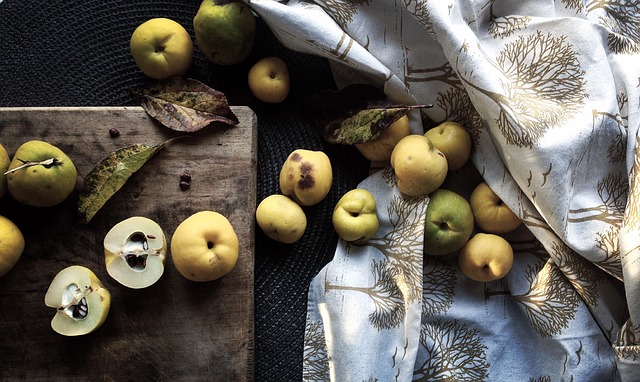
∴
Quince
Protection, Love, Happiness

Quince was used in worship to various deities, particularly Venus (Aphrodite for the Greek), who is often depicted with a quince in her right hand. As such, quinces are associated with love and happiness. Bridal couples in Roman times would share quince fruit to ensure happiness. This tradition lasted throughout the Middle Ages.
Carrying quince seeds protects against, evil, harm, and accidents. Pregnant women who eat quince will supposedly cause their child to be ingenious. Giving quince to a loved one will ensure fidelity.
Quince seeds are mucilaginous and act as a demulcent, which soothes parts of the body that have mucus membranes. For the respiratory tract they can act as an expectorant and help loosen phlegm. The mucilaginous nature also acts as an emollient, and can be used in an ointment to treat cuts and burns on the skin, or in a mouthwash to soothe sore throats. The seeds have a mild laxative effect.
The fruit of the quince is astringent which helps promote digestion and can help treat loose stools. Quince juice combined with apple cider vinegar and honey makes a tonic that stimulates the stomach, liver, and intestines.
Quince fruit has a high amount of pectin, which makes it excellent to make jams and jellies. The juice can be boiled down to make a syrup, and the fruit can be dried and ground into a powder. If you want to try your hand at making quince marmelade seventeenth century style, you can find a recipe here.
Sources:
Cunningham’s Encylopedia of Magical Herbs, Scott Cunningham, 2016, Llewellyn Publications

There are so many medicines available in nature.All we need to do is look.
Quaint
Indeed there is. 🙂
Hi Sara – I love quince jelly … and I hope after your description there are scientists utilising this wonderful sounding fruit to help with those mucilaginous problems so many people seem to have today … as a family we had a quince tree – I think it got removed as it was not that successful … another tree or two would have gone in its place … cheers Hilary
http://positiveletters.blogspot.co.uk/2017/04/q-is-for-quirky-quizzy-facts-and-quaggas.html
I’ve never had quince, and I’m quite curious about the taste. Would be nice if scientists explored all the potentials of quince. 🙂
Ooh, now I know what unique gift to give at the next baby-shower I go to… Happy A-to-Z-ing.
That’s a great idea! 😀
My grandparents grew quince in their garden. I can still taste their homemade quince jelly. It was disgusting!
Another day in Amble Bay!
Haha! I’ve never had quince, so I can’t compare experiences. Maybe that’s a good thing? 😉
all your posts make me think of starting my own pharmacopia – at some stage. I’ll be the guinea pig. Thank you Sara your posts are extremely interesting and thought-provoking.
Yeah, I find myself tempted to try some of these too. Just be careful with some of them! I’d definitely do more research too. Glad you’re enjoying the posts though. 🙂
I can’t remember ever eating a quince or anything made with them, but as I quite often suffer from excess phlegm I should try it! Too much information?
This is a safe zone, so feel free to share all your phlegm woes! 😉 I get horribly phlegmy after a cold, so I’d be interested in giving quince a try. Just need to find some, but that’s a whole new problem!
I am not sure I’d know a quince if it was in my hand.
http://sagecoveredhills.blogspot.com/2017/04/q-is-for-queen-cassiopeia.html
I’m not sure I’d know it either. They look to me like an apple/pear love child, so if I see something resembling that, maybe I’ll know…? 😛
Although I’ve used dried and preserved quince in botanical creations, I’ve never actually eaten one. I’m going to remedy that by first looking for some quince jelly.
I’m quite enjoying your posts Sara – thanks!
I’ve never eaten any quince either. I’ve discovered that “quince”, in Swedish, is “kvitten” (like vampire kitten! This is how I’ll remember it), so I’m now officially on the lookout. 😉
I’ve heard of quince, but that’s it. Wouldn’t know it if I saw it. I’m amazed at all the medicinal properties, though! Thanks for educating me once again. 😉
Glad you enjoyed it. Same here about the quince. Now that I’ve learned a bit more, hopefully I’ll know it if I ever see it. 🙂
I’ve always wondered about the quince…does it belong to the pear, apple or orange family?
I say yes to all of the above! To actually answer your question, though, I looked it up and quinces belong to the Rosaceae family, to which apples and pears also belong. Oranges belong to the Rutaceae family (AKA rue or citrus family).
I never knew that it was a quince that Venus was holding – I think I always assumed it was an apple. Really interesting facts about quinces – I love quince jelly with cheese as it makes a perfect combination.
Pamela @ Highlands Days of Fun
Me too, though I think they are rather similar in appearance, so I imagine it’s a common mistake. If/when I ever find quince jelly, I will have to remember to try it with cheese. 🙂
Cool! This was so informative. All I ever knew of quinces were that they were a kiwi looking fruit that hung out on the store shelf.
Glad you liked it! Though, quinces look rather appley-peary to me. 😛
I once accidentally made pizza with quince sauce instead of tomato…
Also, no one can tell me how to pronounce this right 😀 We call them birsalma.
The Multicolored Diary: WTF – Weird Things in Folktales
That sounds like it must have been an interesting culinary experience. 😉